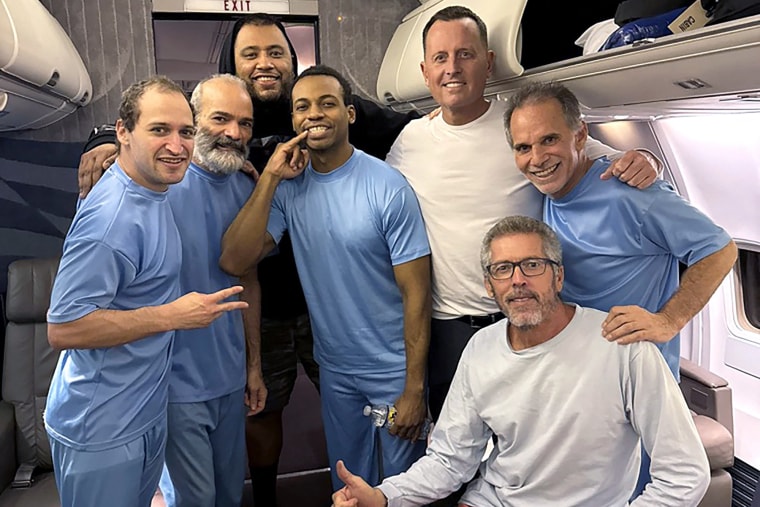
In a surprising move following his meeting with Venezuelan President Nicolas Maduro in Caracas, President Donald Trump senvoy Richard Grenell announced on Friday that he was returning to the United States with six American citizens.
At a time when the Trump administration has been spearheading a deportation and anti-gang campaign in the US, Grenell’s primary goal for the visit, according to Trump administration officials earlier on Friday, was to secure the release of Americans who were held in the nation.
Grenell shared a picture of the six men with him on an airplane online, but he did not identify them. They wore light blue uniforms that were part of the Venezuelan penal system.
Grenell wrote on X, “We are all set to go home with these six Americans.” They couldn’t stop thanking @realDonaldTrump after their recent conversation.
In his own post, Trump applauded the action, stating that Grenell was returning six captives from Venezuela.
Although the precise number of Americans being detained by Venezuela is unknown, at least nine have been mentioned by Venezuelan officials in public statements.
Most of them were charged with terrorism by Maduro’s administration, who also claimed that some of them were elite mercenaries. Foreign detainees and opposition members are frequently accused by the Venezuelan administration of plotting terrorism with the United States. Plots have always been refuted by U.S. officials.
Mauricio Claver-Carone, the U.S. special envoy for Latin America, stated earlier Friday that American hostages detained in Venezuela… must be released immediately and that the Grenell-Maduro meeting was not a bargain in exchange for anything.
After months of talks, the U.S. freed a key associate of Maduro, and the Venezuelan government freed dozens of detainees, including ten Americans, in late 2023.
In a yearly address to the judiciary late Friday night, Maduro informed officials that he and Grenell had a productive discussion.
Maduro stated that he would be examining whether the U.S.’s communication regarding the meeting reflected the discussions he had with Grenell. “There are things where we’ve reached initial deals and when they are complied with, new issues will open, hopefully new deals for the good of the two countries and the region,” he said.
Maduro stated, “President Donald Trump, we have taken a first step; hopefully, it can continue.” We want to keep it going.
The Venezuelan government stated in a statement early Friday that Maduro and Grenell also talked about sanctions and migration in the presidential palace.
Grenell was also focused on ensuring the return of 400 Tren de Aragua gang members in U.S. custody to Venezuela, White House press secretary Karoline Leavitt said earlier Friday.
Claver-Carone stated that a deal on Tren de Aragua deportations could not be negotiated.
Although the group was disbanded in Venezuela in 2023, Venezuelan Attorney General Tarek Saab stated this week that the country was open to resuming legal collaboration with the United States in order to extradite gang members.
With promises of mass deportations, Trump has launched a broad immigration crackdown since assuming office on January 20.
The previous administration had granted deportation reprieves to about 600,000 Venezuelans in the United States, but U.S. Homeland Security Secretary Kristi Noem indicated she will shorten the safeguards’ lifespan. She has till Saturday to decide whether to fire them.
Leavitt stated that the United States does not acknowledge Maduro as the rightful leader of Venezuela as a result of Grenell’s visit.
The recent history of the two nations has been tense, characterized by strained ties, sanctions, and charges of coup plots.
However, they are interested in a number of unresolved bilateral matters, like as a license that would permit American oil giant Chevron to conduct business in Venezuela.
Former U.S. President Joe Biden’s government enhanced prizes for the capture or conviction of officials like Maduro and reinstated wide oil sanctions after claiming Maduro had broken promises for a free presidential election, leaving Trump with few alternatives for more sanctions.
The opposition, international observers, and many nations, including the United States, are contesting Maduro’s government-backed victory in the July 2024 referendum.
Maduro’s administration has consistently resisted sanctions imposed by the US and other countries, claiming they are illegal actions that amount to an economic war intended to destabilize Venezuela.
Chevron is attempting to defend a unique U.S. license that permits it to conduct business in Venezuela, according to a Friday Financial Times article.
After Trump stated that the United States would probably stop purchasing oil from Venezuela and Secretary of State Marco Rubio stated that the license should be reexamined, Chevron CEO Mike Wirth informed the newspaper that the business would communicate with the White House.
